This adult White-crowned Sparrow was using the frost-covered twigs almost like its own private store of unflavored popsicles.
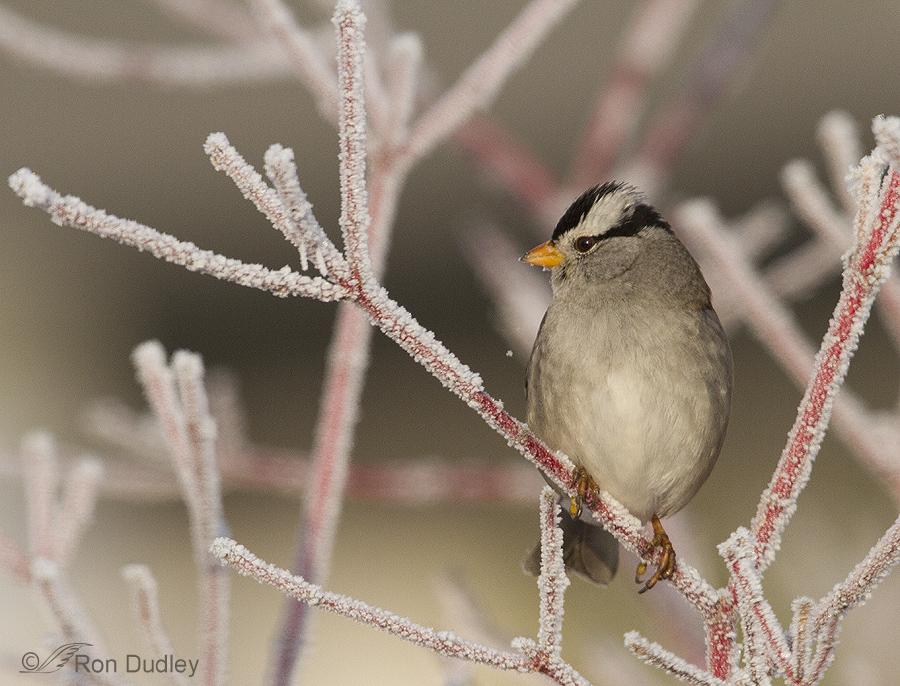
1/2500, f/8, ISO 640, Canon 7D, 500 f/4, 1.4 tc, natural light, not baited, set up or called in
I found this thirsty bird six days ago in a bush on the periphery of Farmington Bay WMA. The temperatures were still below freezing so the only water available was in the solid state – morning hoarfrost still clinging to the twigs. Here the sparrow has just eaten the frost from the twig next to its right foot (you can see where it has been scraped away from the red bark) and it’s looking toward the next part of the twig it will harvest.
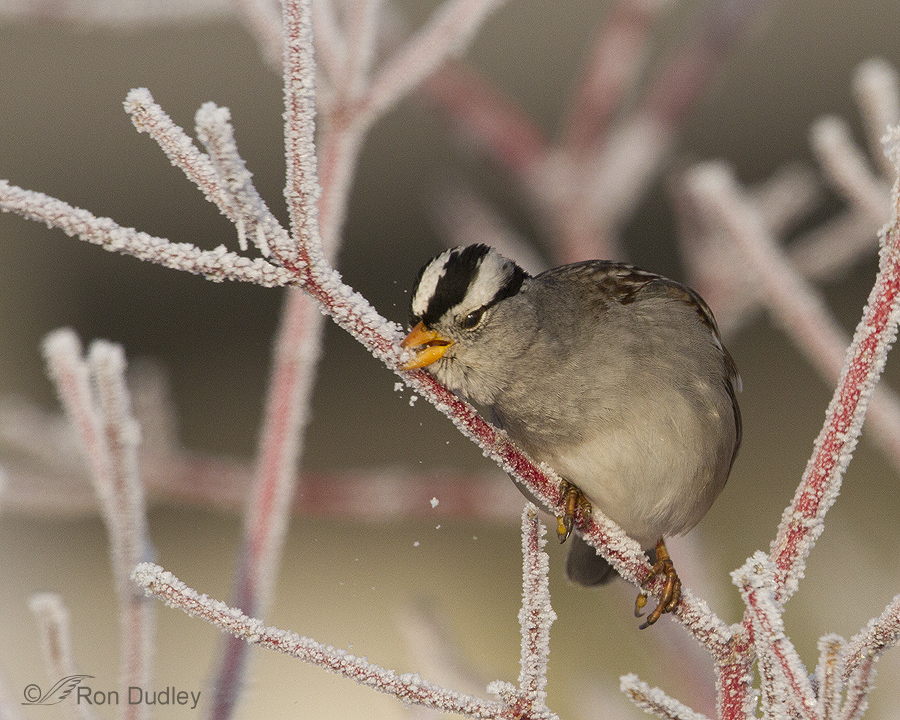
1/2500, f/8, ISO 640, Canon 7D, 500 f/4, 1.4 tc, natural light, not baited, set up or called in
Those mandibles were efficient frost-scrapers.
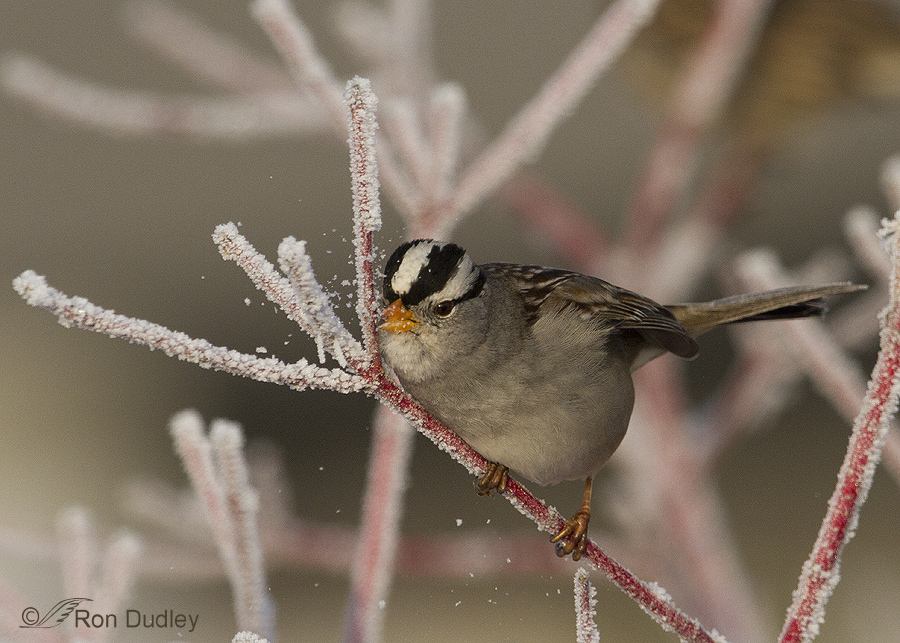
1/3200, f/8, ISO 640, Canon 7D, 500 f/4, 1.4 tc, natural light, not baited, set up or called in
The action was quick so I’m glad I had a relatively fast shutter speed. At times the frost was really flying through the air.
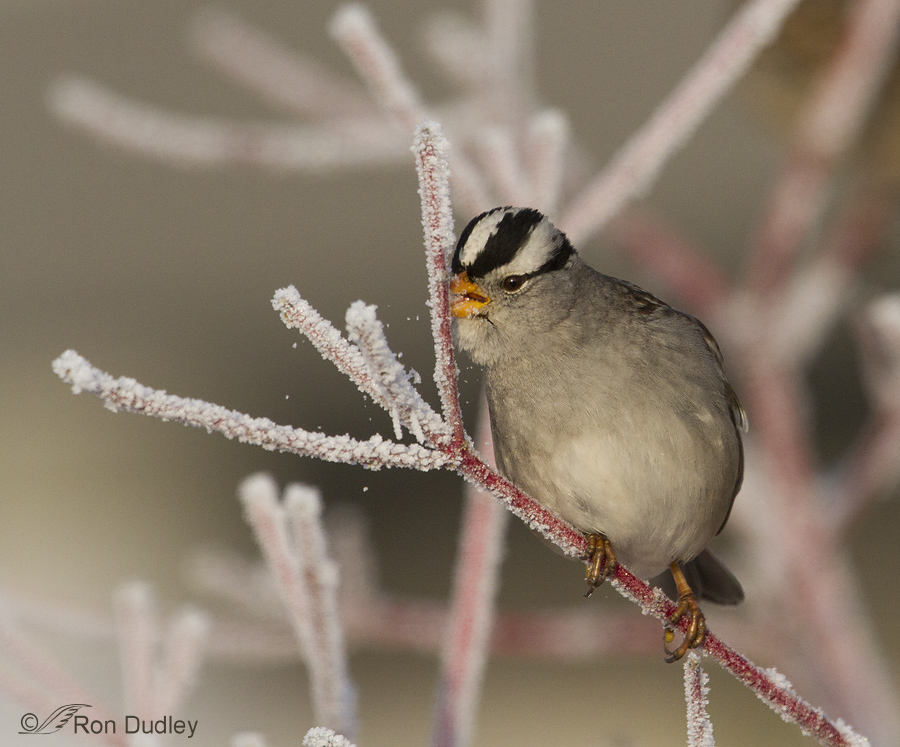
1/2500, f/8, ISO 640, Canon 7D, 500 f/4, 1.4 tc, natural light, not baited, set up or called in
It cleaned both sides of the twig…
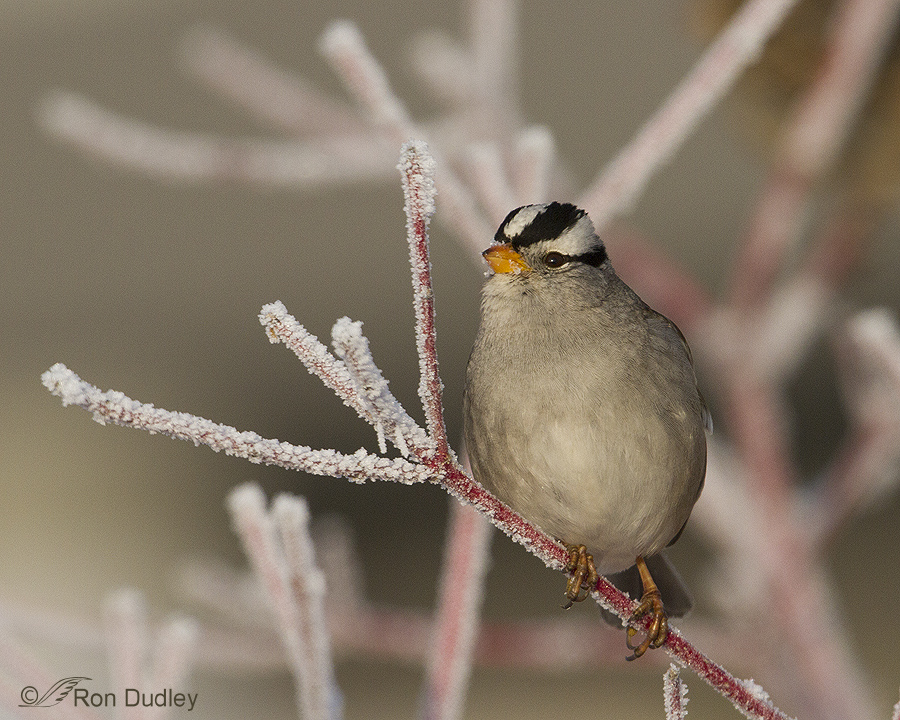
1/2500, f/8, ISO 640, Canon 7D, 500 f/4, 1.4 tc, natural light, not baited, set up or called in
before inspecting the last little bit left up top…
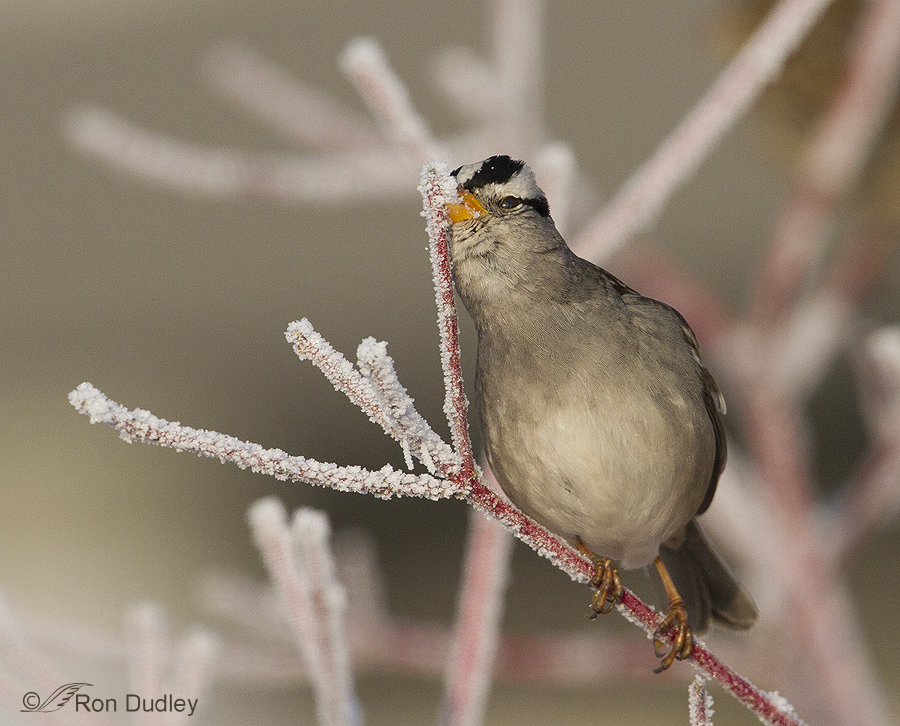
1/2500, f/8, ISO 640, Canon 7D, 500 f/4, 1.4 tc, natural light, not baited, set up or called in
which didn’t last long either. Next the bird started eating the frost off the three twigs to the left but the vertical twig was in front of its head and neck so I didn’t include any of those shots.
I see this frost-eating behavior most often in the mornings when the rising sun hasn’t yet melted the frost and provides some warmth to make up for the heat loss caused by ingesting frost. Makes sense to me…
Ron


Most interesting behavior. This is a very enjoyable series of photos.
Great captures, find the first one very pretty composition-wise.
What beautiful birds these are, and your photographs really display this one well! I confess, growing up in Florida I didn’t have much chance to eat snow as a kid, but while attending Syracuse University in upstate New York, I just HAD to try it! That stuff is cold!
Fantastic series of shots, love it!
Very good information for me as I was wondering where the birds get the water they need when there is only ice. The photos are really beautiful, too. Thanks for the morning upper!
I love all your photos, but I find that the ones I enjoy most are the ones that show behavior like these. I love this series of photos so much!
Absolutely sensational shots Ron!Thanks so much for sharing!
Charlotte
Wow–what a great series, Ron. The action is great, and I love the lines and composition in the first photo.
A great series: technically excellent shots telling a very interesting story.
Thanks very much, Dave.
So sweet! And educational too. Living in the Los Angeles area, I really hadn’t thought about how birds got their water in areas where it freezes. Soory about the loss of your sister. I grew up in Western Washington and ate some snow when we had it in the winter. I hope the winds didn’t blow over the mountains from the Hanford Nuclear Power plant. I wasn’t aware of that situation. I also want to tell you how much I enjoy your daily photos and information. I think most of your readers know more about birds than I do, and can make more intelligent comments. Yet I am learning! And you always have such superb images –the very best!
We’re all learning her, Susan – me as much as anyone. Thank you.
An EPIC capture Ron! Again, capturing interesting and enlightening behaviors through pristine photography. I love it!
Thank you very much, Bryce. Glad you enjoyed the series!
I’ve seen squirrels nip off small twigs on our maple tree and drink the sap….which must provided thirst quenching liquid and sweet nutrition…I wonder if birds sip from these sites, too, but haven’t seen them do it. We try to supply water, but it freezes quickly.. One of my sister lives on Bald Head Island (NC)…told me she’d been watching a flock of yellow rumped warblers trying to take a bath on the ice in a frozen bird bath (big plastic plant saucer). They were going through all the motions of bathing, wings fluttering, etc., but no water splashing. A couple of them were drinking from a thin ring of still unfrozenwater at the outermost rim of the ice. It has been colder on Bald Head than it has in Alaska…
Patty, Sap-drinking birds is something I haven’t seen in winter.
I was saddened to learn that you lost your sister to cancer decades ago, most likely due to your family’s proximity to the Hanford Nuclear Project. And I feel grateful that in some regions, vigilant advocacy for environmental health is making progress.
I’ve never seen anything like this series re the White-Crowned Sparrow. It reminds me of eating corn on the cob!
Thanks, Alison. My sister actually lived with the disease for over 25 years before succumbing to it.
With really cold weather this winter I was wondering what the birds did for water. I’ve seen my dogs eat snow and I’ve eaten snow but I never saw a bird eat snow or frost until your photos. Thanks for answering that puzzle for me.
Birds eating snow or frost is something I’ve seen fairly often, Pam.
Great series Ron! I almost feel like I’m watching a documentary on TV as I scroll down the pics and read the commentary…very sorry to hear about the tragic loss of your sister.
Peace,
Bill
Thank you, Bill.
Ron–Interesting images of one of my favorite little winter visitors….Sorry about your sister…you’re theory is probably spot on. So…folks who had their own milk cows couldn’t safely drink the milk…so sad!
White Crowns are my favorite winter visitors as well. Love their song, and such sweet little faces.
Thanks, Patty. If I remember correctly (I was pretty young) we couldn’t drink any fresh milk from anywhere in Montana. Had to use Carnation powdered…
Unbelieveable…
Fascinating behavior. Living in the SF Bay Area, I’ve never given any thought to how a bird might drink when all is frozen. Lovely images and as always, thanks for the insights into bird behavior.
They occasionally eat snow too, Sharon but either one really robs them of heat.
He eats frost I used to eat snow as a kid, I guess we all are kids at heart! Probably the next substitute to water for him.
Great shots Ron, many thanks for sharing.
Thanks, Dick. I ate snow as a kid too (early 50′s) but had to stop because in western Montana we were downwinders from the Hanford Nuclear Project in Washington State. Every kid was warned not to eat snow and we even stopped drinking local milk. My younger sister eventually died from thyroid cancer, very likely related to the radiation. I haven’t eaten snow in almost 60 years…